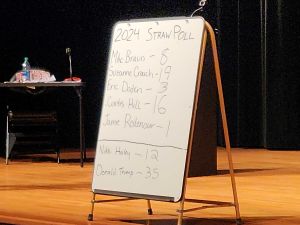
Source: Tony Kinnett
KNIGHTSTOWN, Ind.–At 9:00AM Saturday in the auditorium of Knightstown High School, five of the six Indiana GOP gubernatorial candidates took the stage to make their case before precinct committee members and locals from across Indiana’s 6th congressional district in the first straw poll of the GOP gubernatorial primary.
Senator Mike Braun, Lieutenant Governor Suzanne Crouch, Eric Doden, former Attorney General Curtis Hill, and Jamie Reitenour gave their opening statements on why they should be governor before a short ranked question session and the straw poll voting itself.
I sat back in my second-row media seat on the right side and watched as Nate LaMar, the former Henry County Council president and member of the Indiana District Export Council, welcomed what appeared to be over 100 in attendance amidst a snowy and icy Indiana February Saturday. While all six candidates’ tables were present in the entryway, Brad Chambers was noticeably absent.
I say noticeably, though the vast majority of Hoosiers know very little about the man save his series of unsolicited campaign advertisement text messages.
Indiana’s 6th congressional district covers the 11 counties most associate with the “Eastern Central Indiana” region so many of us use. LaMar told me that he was “pleasantly surprised at the number of members of public who showed up despite the weather.”
In total, 47 Precinct committee members attended and voted, including a representation from each of the 6th’s counties (with just one committeeman from Randolph). Had it not been for the inclement weather, LaMar suspected that “around 75” committee members would have shown up to vote.
While the present GOP gubernatorial candidates made their opening statements, precinct committeemen and women wrote their most pressing question for the governor-hopefuls on a card, and LaMar dutifully sorted them from most to least popular questions.
This was arguably the most interesting thing going on at that time, as the opening statements from the candidates were so rehearsed and over trodden half the crowd assembled were practically mouthing along with the candidates as they spoke. Every candidate leaned on the same four or five pillars of the GOP that would be at home in any opening statement at a Lincoln Day Dinner from Alaska to Florida.
The substance of each speaker’s words was and is far less important to the results of this straw poll—as you’ll soon see. Four out of the five on stage (we’ll get to Reitenour) had, more or less, very similar policy proposals. They were all for reducing the tax burden on Hoosiers, all were for giving parents control over their kids’ education, and all promised that Indiana would be a stalwart ally of law enforcement and border states.
There were three notable differences in the campaigns of Braun, Crouch, Doden, and Hill. They centered on the Indiana Government’s role in economic development, the Holcomb administration’s handling of the COVID-19 pandemic, and the intensity of engaging with cultural issues. I didn’t mention Reitenour for a reason—bear with me, we’ll get to her.
LaMar proposed the four most popular questions to the candidates: how Indiana handled COVID-19, how the candidates would “close the gap between the flush-cash position and the struggles of the rural counties, defining the state’s role in land purchases for economic development, and thoughts on legalizing marijuana.
At this point, you might expect me to delve into each candidate’s answer verbatim, picking apart the policy proposals juxtaposed with the histories of each issue ad nauseum. I’ll only note two key highlights that are essential for any Hoosier voting in May’s GOP primary:
Every candidate but Crouch denounced the Holcomb administration’s handling of the COVID-19 pandemic. Crouch tried her best to dance around the Holcomb albatross, saying, “we can’t go back, all we can do is move forward.” She noted “failures of our executives” but didn’t mention who or what, specifically, she was talking about.
Whereas every candidate but Crouch lambasted governmental overreach, the lieutenant governor pivoted the question into a need for mental health incentives due to the rise of anxiety and depression since the pandemic.
When candidates were asked about whether Indiana should buy and develop land with taxpayers’ money for “economic development”, including the disastrous LEAP project, the answers were a bit more diverse.
From the answers given on stage, Hill and Braun seemed to favor the state minding its own business and letting local governments make such decisions. Doden proposed economic initiatives that developed small towns to encourage Indiana’s kids and grandkids to build lives here, and Crouch (in a possible Freudian slip) said that she would make sure there was a water plan before spending billions on an untransparent project.
Braun and Hill presented themselves as conservative “outsiders,” Crouch was remarkably establishment (though trying to take the edge off with a promised income tax abolition), and Doden tried to do a bit of everything at once.
The more astute reader might notice that I left out quite a bit concerning marijuana and the also repetitious closing statements. None of that mattered in this debate at all. When the final votes were tallied and candidates concluded their handshaking session, LaMar presented a whiteboard tally that caused an audible gasp in the room.
Mike Braun: 8
Suzanne Crouch: 19
Eric Doden: 3
Curtis Hill: 16
Jamie Reitenour: 1
–
Nikki Haley: 12
Donald Trump: 35
Internal polls had put Braun at 40% in January—how had this happened?
Braun was the most known candidate, of course. He has presented himself, accurately so, as a conservative senator among the ranks of Mike Lee of Utah, with Donald Trump’s endorsement. He’s fighting a dual battle in Congress and on the primary grounds in Indiana and it’s working—but he showed up to this debate looking tired (understandably so).
Therefore many of his assumed votes went to Hill, who commanded the stage. The only man in a suit, who spoke clearly and directly. His message? “Scoreboard.” He punched at Crouch by pointing out that he’d stopped Holbomb’s COVID-19 mask mandates in its tracks. He slighted Reitinour’s inexperience. Braun even gave “kudos” to Hill twice on stage.
Crouch was his more establishment counter. She came prepared, knew her way around each point and my goodness, she could certainly weave through any question without taking the implied damage it would bring given her Holcomb-set record. Shifting the COVID-19 overreach blame to a discussion on the importance of mental health? Very impressive.
The other candidates simply couldn’t compete. Applause for Crouch and Hill was louder and more prolonged, Hill was the only candidate to be interrupted by applause (and a few standing) during one of his answers, in which he asserted that there were only two genders, male and female.
Then there was Jamie Reitenour. Perhaps the most populist candidate present, Reitenour has spent more time in her campaign telling people that she was “called” by God to run for office than presenting a clear set of plans or policies to run the state. The entire time she was on stage was devoted to telling us about how much she liked “Indiana goodness” in her seven years since living here and a series of unrelated stories and anecdotes that felt more like watching an episode of Parks and Recreation than a serious candidate.
The one vote she received speaks for itself, but I will assert one very crucial point: your desire to run is not enough merit to win votes. Competence will forever be more valuable than raw passion. Talking about how we’re all “dancing with the devil on the dance floor” so we need to “turn the music off” sounds more like an SNL sketch with Chris Farley than a leader anyone should take seriously.
Posturing at the end of your closing statement by telling everyone “for shame” because we didn’t start proceedings by asking present veterans to stand is as transparent and juvenile as the rest of her comments.
What do we glean from this straw poll? Has Crouch soared past Braun with Hill close at her heels? Is Crouch set to split the Braun/Hill votes while securing the establishment and corporatist GOP votes? The answer to both of these is unequivocally “no.”
Crouch told me that she attributed her victory to her focus on “values” and mental health. While those are noble goals, I don’t believe that’s what carried her to the front of the poll—nor will that carry her to win the primary in May. Crouch is the more popular of the two establishment candidates.
Nikki Haley pulled 12 votes, and I would guess (though I didn’t ask LaMar to divulge) that all 12 Haley voters also voted for Crouch. The “Trump” voters were split among the five present, and while I think Crouch performed admirably at connecting to the precinct committee members of the 6th, I do not think it’s enough to shake her association with Holcomb.
Given that assumption, Hill pulled ahead as far as he did because he outperformed Braun in presence and communication, which I attribute most to Braun likely being exhausted from a tough two months in the Senate holding the line against McConnell.
Hill’s performance was stellar, and as his campaign aptly told me, “Curtis has tapped into Hoosiers desire for a proven conservative leader. When Hoosiers hear his authentic message, it resonates.” That was certainly true on the stage Saturday—but I doubt it will be enough.
As of January, Braun had raised over $2.1 million in comparison to Hill’s $374,000. That, coupled with established name recognition, will be more than enough to win over the majority of traditional conservative voters. Trump’s endorsement secures the populist vote en masse—this only leaves establishment/corporatist GOP voters, a dwindling faction.
That dwindling faction, made up of many of the “old guard” in the GOP, supports Crouch, of course. Note that a broad “coalition” of courthouses and other elderly GOP threw their endorsements in with Crouch.
With Indiana shifting towards traditional conservatives and populists as “neocons” or establishment voters age out (and the younger ones becoming increasingly irrelevant), it’s going to be either Hill or Braun. Hill and Braun are very similar candidates, but name recognition and an “energetic Mike” would likely be fatal to any other Hoosier’s gubernatorial run.
As one precinct committeeman told me, “I’m ready for a [Ron] DeSantis, a [Bill] Lee, or a [Kim] Reynolds. I would be happy with Braun or Hill.”
If this is the case for most Hoosier voters, history shows that when two candidates are equal in the eyes of the voter in policy, governance, and character, the bigger spender and “higher up the ladder” candidate usually wins.
If there is one key lesson to learn from what I’d argue was one of the best-run straw polls I’ve been to in years, it’s this:
The three factions of Indiana’s GOP are openly vying for the future of the party. The winner of this gubernatorial primary will ultimately decide what Hoosier Republicanism does for the next decade—and it’s going to be Braun, Crouch, or Hill.












